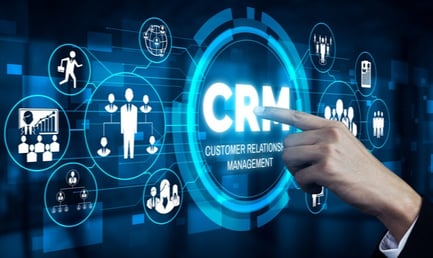Inbound Marketing Blog
for Manufacturers and Healthcare Companies
Returning to Trade Shows? Lead Generation Ideas for Your Strategy

With loosening COVID restrictions, trade shows are forecast to be a popular destination in the second half of 2021, and certainly all of 2022. After months of being stuck in virtual conferences, most of us are ready to get out, stretch our legs, and work for quality leads in-person.
As COVID-19 changed the way we work, trade shows also began changing. Popular events and keynotes went fully remote. Now it’s time to use a hybrid of in-person and digital techniques to improve your trade show lead generation -- that’s one part of COVID adaptation that should stay.
Here are five slick lead generation ideas for your trade shows digital marketing strategy in 2021 and 2022:
5 Proven Trade Show Lead Generation Ideas:
Up your trade show game by blending what’s worked before with what appeals to today’s trade show prospects:
- CRM is a must
- Organize your leads and prove ROI
- Plan your communication
- Automation of email marketing
- Launch multi-approach campaigns
1. CRM Is a Must For Trade Show Lead Generation
It’s no secret that a company’s most valuable assets are its customers -- and a successful trade show can mean a traffic jam of data entry and business card collecting. Therefore, using a customer relationship management (CRM) tool is a must.
A robust CRM software allows a user to create and track leads throughout the buyer's journey. Logging customers during or directly after a trade show allows you to send automatic follow-up and thank-you emails, track engagement, and plan for meet-and-greets at future events.
When preparing for your next trade show; employing a CRM can help you identify past attendees of the show, the return on investment of the show, and plan for better communication with leads.
Never let a lead fall out of your pocket again.
Related Resources:
- 10 Lead Generation Strategies for Your B2B Buyer Persona
- 5 Quick-Win B2B Medical Marketing Lead Generation Tactics
- B2B SEO: How Long Does It Take to Rank in Google?
2. Organize Your Leads and Prove ROI

Trade shows can get hectic; but don’t let that stop you from organizing your leads post-show. Inputting all-new lead information into your CRM not only allows for automated and targeted email follow-ups and premium offers, it also allows you to track the overall conversion rates, establishing a base ROI for each show.
The basic calculation for ROI is: (Profit - Expenses) / Expenses.
“Profits” in this case are any conversion or sales made directly from the trade shows, whereas expenses represent costs related to travel, lodging, food, displays, etc. ROI is dynamic and will increase over time as leads convert into customers.
Maximizing ROI isn’t just about lowering expenses. Tracking lead conversion pathways from each trade show can identify trends in your customer base and help you create or bring more specific marketing materials.
(Related Resource: Manufacturing Trade Show Ideas for Making the Perfect Follow-Up Email)
3. Plan Your Communication

Now that all of your leads are organized and labeled through your CRM, sending out follow up emails and planning future communication is crucial.
While sending a thank-you email 45 minutes after the trade show ended isn’t necessarily the best idea, including valuable content can keep your company fresh in the minds of your attendees. Content options include:
- Whitepaper or e-book
- Services & capabilities catalog
- Educational blog posts and videos
Planned communication doesn’t have to be just post-show. When prepping for trade shows, send a “save the date” teaser email.
Using a CRM software like HubSpot, automatic emails can be scheduled to go out pre-, during, and post-show to any past attendee, inviting them back to your booth. You can even use paid and organic social media outreach to find prospects or see if existing ones would like to talk in-person.
4. Automation of Email Marketing (and Social Media!)

includes a barrage of automated features, including, but not limited to:
- Marketing email automation
- Sales follow-up email automation
- Follow-up task scheduling
- Closed-loop reporting
- Personalization tokens
- Integration with other efficiency software
- Social scheduling tools
Having automation is one of the best trade show sales strategies to have and is a sure-fire way to ensure that your quality and quantity are spot-on when it comes to trade show lead follow-up.
Listen: It’s no secret that salespeople are (usually) not the best marketing copywriters. By leveraging automation tools, either native to your CRM or as a third-party software tool, your sales and marketing squads can collaborate to craft the perfect touchpoints' every time.
5. Launch Multi-Approach Campaigns
It bears repeating: Lead generation ideas for your trade show strategy should always include content for pre-, during, and post-show. But your expo marketing material shouldn’t rely solely on email, or only on one social media platform.
- Pre-show: Create a social campaign that educates your viewers of the trade show you're attending, your booth number, and its hours of operation. Include a blurb in your monthly newsletter and write an educational or entertaining blog post promoting the event.
- During the show: Thanks to automation, you can have pre-scheduled email and social blasts go out during the show, shouting out your location (booth number, floor level, etc). Be sure to add fresh content too, such as day-of photos of the show floor. Make sure you’re using the official show hashtag and user handle on social media so everyone sees your stuff!
- Post-show: Create follow-up campaigns thanking attendees for visiting and include a valuable offer (i.e. free e-Book).
Resources: Trade Show Lead Generation Ideas
Need help putting together a good strategy for increasing your B2B brand awareness? A trade show marketing agency can help improve the quantity and quality of your leads.
Or, to keep self-educating, check out this free e-book:
Our Blogs, Direct to Your Inbox!
How to Audit your Online Marketing
If you are executing digital marketing, congratulations! You are most likely already one step ahead of your competition, and making strides to meaningfully connect with prospects online. But, how do you know if you’re seeing continual success year over year, and improving your metrics?
Without the tools in place to analyze and benchmark your efforts, it is impossible to scale your online marketing and ensure continuous success.



